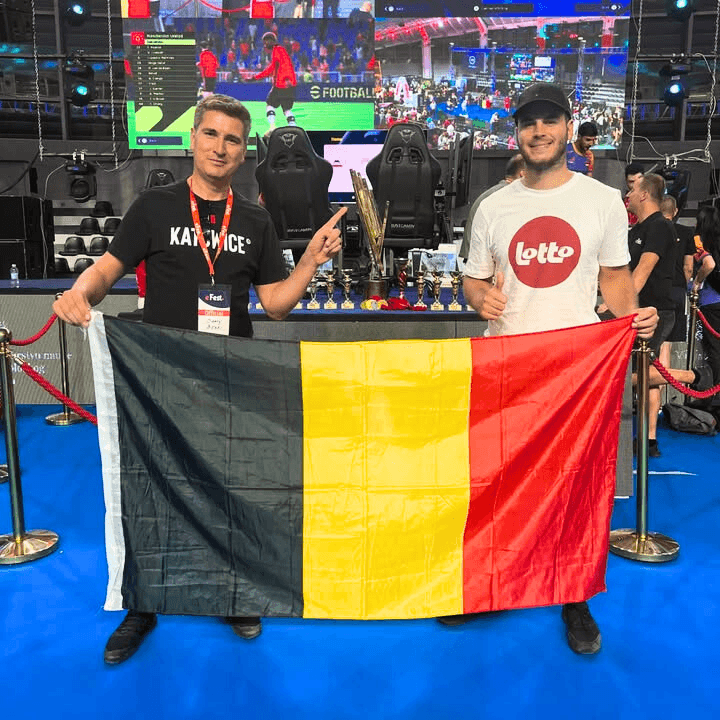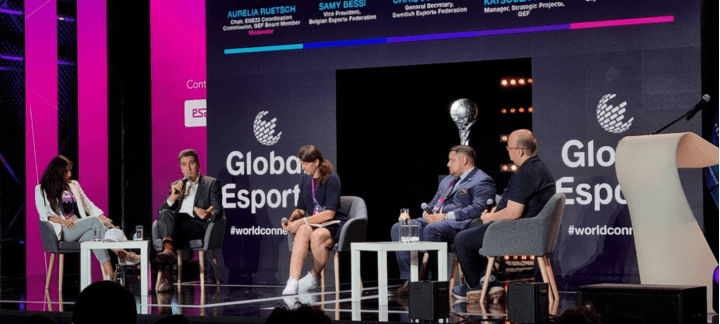
Behind the BESF: An Interview with Vice President Samy Bessi
At the Belgian Esports Federation, we want to highlight the people behind our work and give our community a clearer sense of who we are. As part of that effort, we’re starting Behind the BESF; a series of short interviews with members of our team and support network.
To kick things off, we spoke with BESF Vice President Samy Bessi about his journey in esports, how the industry has evolved, and where he sees things heading for Belgium and beyond.
• • •
Samy, thanks for joining us. You’ve been involved in esports for many years now. How did your journey in the industry begin, and what initially drew you to the space?
It all started back in the early 2000s when I was at university. My flatmate was from the United States, and my first real exposure to esports was watching him compete on the US servers. I immediately had this sense that esports was going to become something huge in Europe as well. That’s when I began investing my time and money into creating an esports club active across both the US and Europe. We focused on titles like Counter-Strike, Call of Duty, Smite, and FIFA. Looking back, that was really the beginning of my journey.
Looking back over the last decade, how would you describe the evolution of esports in Europe and Belgium specifically?
If we look at the last ten years, I’d say 2015 was when things really started to shift. At that time, I was running a team that had an international profile, and it was clear esports was about to take things to the next level. Globally, recognition had already come from Asia and the United States, where esports was being compared directly with traditional sports. In Europe, we were a bit late to that recognition, and the scene was not unified. But in just ten years, the perception has completely changed. Esports has gone from being seen as something for “geeks” to being acknowledged as a legitimate sport. For me, that’s a huge step forward. In Belgium, it’s more complex because of our regional structures, which can make progress slower, but with the federation we’re working towards recognition both from government and eventually from traditional sports federations. With the upcoming Esports Olympic Games, I think we’re moving in the right direction and the progress will only continue.

What are some of the most significant challenges you’ve faced or observed during your time helping shape the structure and legitimacy of esports?
The biggest challenge has always been explaining to people that esports is just one part of the wider gaming industry. It sounds simple, but many people confuse the two. They often associate esports with the negative stereotypes of gaming, rather than seeing the positives of competition, teamwork, and performance. Every time I meet someone new who isn’t familiar with esports, I find myself needing to explain the distinction between gaming as a whole and esports as organised, competitive play. Of course, you can’t have esports without games or players, but the competitive structure is what makes it unique.
Another challenge has been overcoming resistance from the traditional sports world. Before COVID, I often heard that esports couldn’t be considered a sport because it wasn’t physical. But the landscape is changing. We now see more physical, movement-based digital games, and at the same time, the biggest esports titles like Counter-Strike, Dota, and League of Legends continue to drive the ecosystem forward with players who display incredible skill, discipline and athletic qualities. Slowly but surely, esports is being welcomed into the broader sporting world.
You hold leadership roles at both national and global levels. How do you balance these responsibilities, and what perspective does that dual involvement give you?
In both my national role with BESF and my international responsibilities, the goal is the same: to help level up the esports ecosystem. Having a global overview allows me to make sure Belgium is keeping pace with developments worldwide, because things in esports move very quickly. Belgium is a relatively small country, with multiple language communities, so our esports scene isn’t as big as some others. But as the home of the EU’s capital, we have a unique role to play. We can lead by example in areas like inclusivity, responsible behaviour, and building a positive legacy.
On the international side, I work with organisations such as UNESCO, the UN, and the Olympic Committee to answer questions, share expertise, and help find common ground. That collaboration ensures esports is part of important global conversations, and I’m proud that Belgium has a voice in that space.

What excites you most about the future of esports, and what role do you see federations like the BESF playing in shaping that future?
What excites me most is the audience. Esports reaches a young demographic, but that same audience is now growing older, moving into leadership positions in politics, companies, and wider society. That means awareness and recognition of esports will continue to grow at every level.
For the future, it’s all about working together. If stakeholders of every sector and size, big and small, collaborate, we can put Belgium firmly on the European esports map. It’s not just about supporting the largest organisations; it’s equally about the grassroots communities. By strengthening the grassroots ecosystem, we can create a healthier, more sustainable environment for esports to thrive. Federations like the BESF are central to that mission, because they can bring all the stakeholders together and make sure progress benefits everyone.
Thanks Samy, we really appreciate your time and the insights you’ve shared.
My pleasure! And GLHF Belgium, let’s keep building and showing what we can achieve!
• • •
A big thank you to Samy for sharing his story and for his long-standing support of Belgian esports. His commitment has been key in building the recognition and resources we enjoy today, from a base camp facility in Brussels to exhibition matches at Pukkelpop and partnerships across Europe. We’re glad to start this series with his perspective.
Through these interviews, we want to shine a light on the people and ideas driving Belgian esports forward. Stay tuned for more conversations soon!
Stay up to date with our latest news
If you want to keep up with our latest developments, don't hesitate to subscribe to our newsletter!




